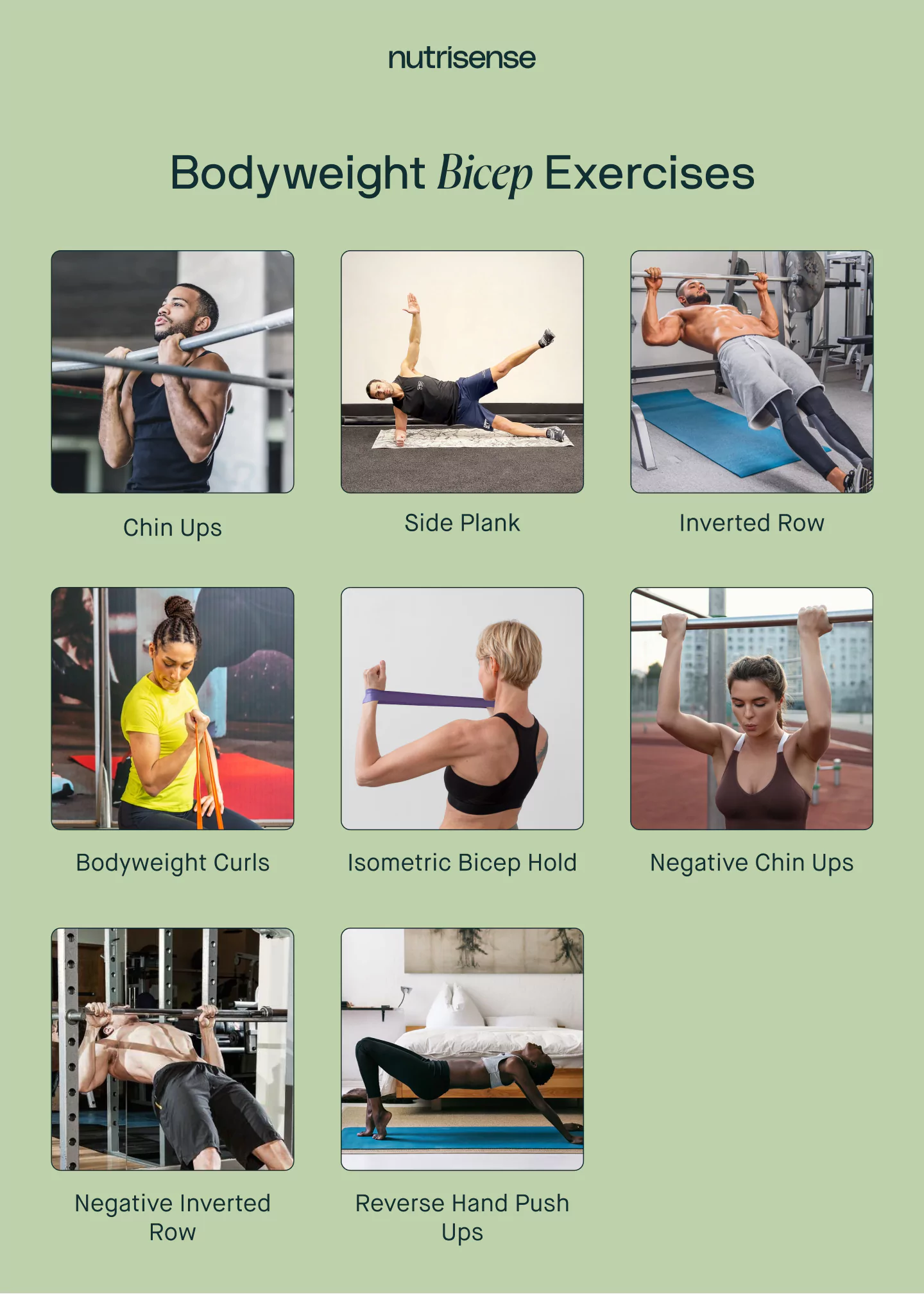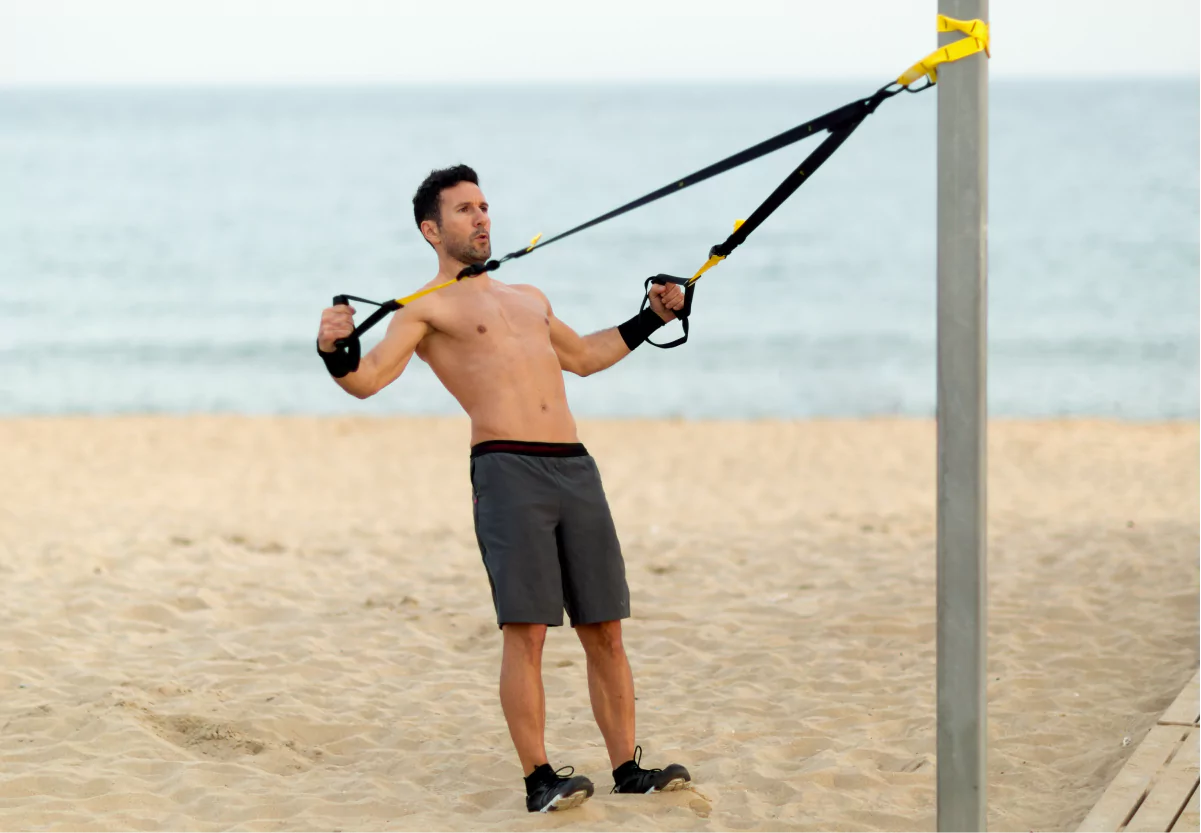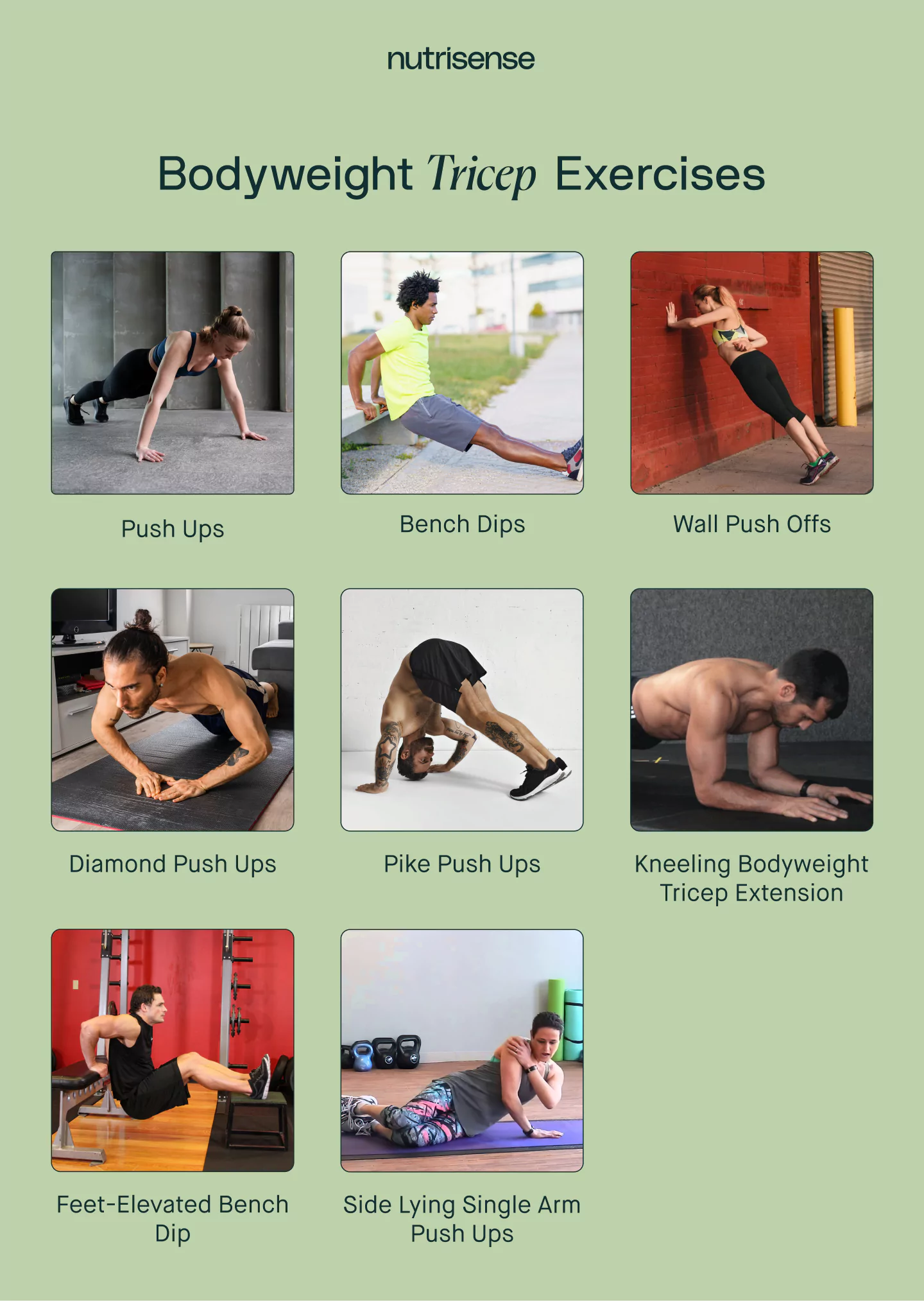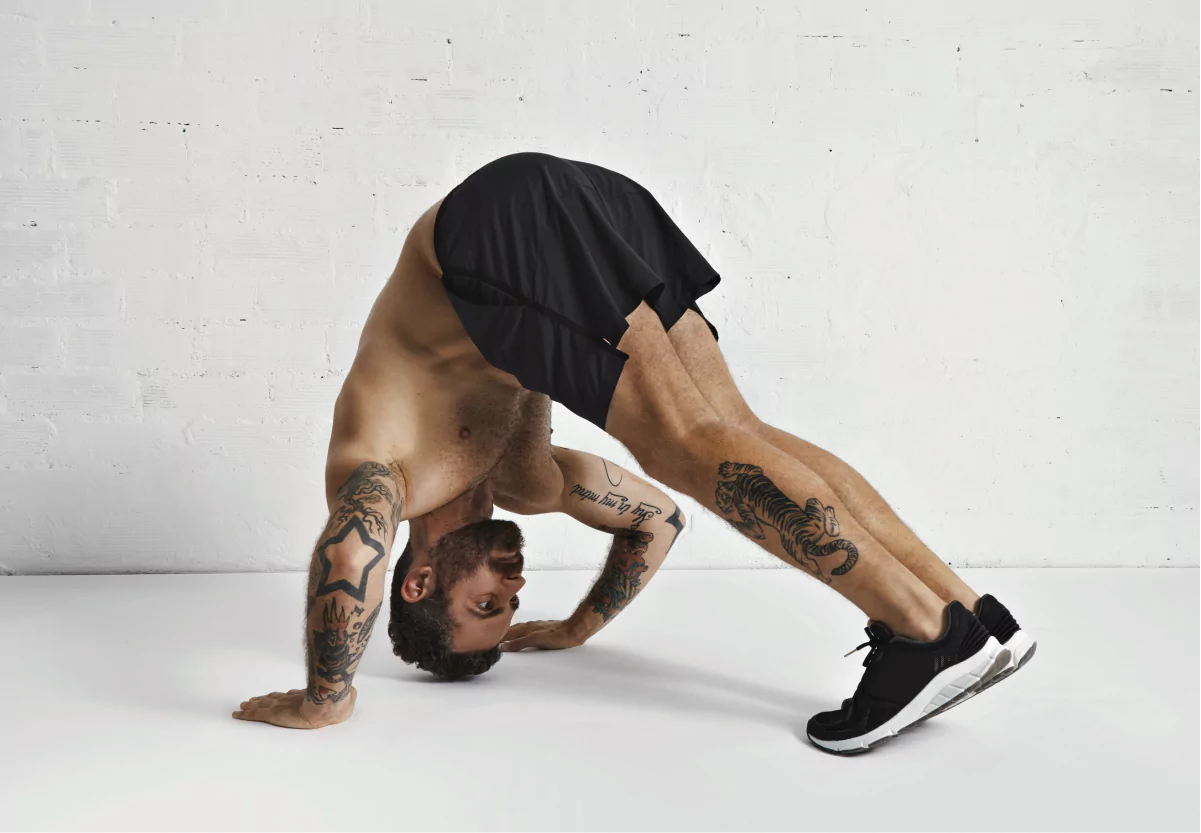8 Best Bodyweight Exercises for Biceps and Triceps
.jpeg)
Key Takeways
Bodyweight training, or BWT, is a form of strength training that uses the body’s weight as the primary source of resistance. Think push ups, pull ups, planks—any exercise where you’re against your own weight, as opposed to using dumbbells or other external sources of resistance.
One of the great things about bodyweight training is that it’s usually accessible for anyone, no matter their activity level, physical fitness, or age. So, if you’re a beginner in need of an effective bicep workout or just want to strengthen your upper arms without weights, you’ve come to the right place.
Let’s explore the benefits of bodyweight workouts and how you can build bigger biceps and triceps without any equipment at all!
What Are the Benefits of Bodyweight Exercises?

BWT can provide an accessible and tailorable way to achieve muscle growth and improve cardiorespiratory fitness for people, regardless of physical fitness and experience. Following a bodyweight workout routine may offer a number of different benefits, including:
- Increasing cardiovascular health and endurance
- Building muscle strength
- Boosting cognitive function
- Improving core stability and joint stabilization
Plus, bodyweight training can be done from almost anywhere, making it a great option for a home workout since no equipment is needed.
The Importance of Strengthening Your Arm Muscles

Upper body strength is a crucial part of overall physical health. Having strong arms may offer a wide range of benefits, such as:
- Improving coordination
- Making other daily activities easier
- Reducing risk of injury
- Improving performance for other workouts and sports
- Reducing the risk of muscle loss with age
- Helping with daily life for patients with COPD
Can You Grow Your Biceps With Bodyweight Movements?

When it comes to strength training, what first comes to mind is probably something along the lines of a dumbbell or barbell in the gym. But the truth is, using external weights isn’t the only way to build muscle in your bicep muscles.
With a combination of bodyweight, isometric holds, and even things like a TRX or resistance band, you can perform a number of different exercises to strengthen and build muscle in your biceps.
Biceps training is a great thing to do, too, as biceps have a number of important functions in regards to your range of motion. The bicep is involved in most pulling motions, and they’re responsible for turning the forearm and also help stabilize the shoulder.
8 Best Bodyweight Bicep Exercises

Here are eight of our favorite bodyweight exercises for big biceps:
1) Inverted Row
With the inverted row, you’ll need a squat rack and an empty barbell. Set the bar about waist-high on the rack, then remove the bench from the area underneath.
- Lie on your back under the bar, with your chest directly beneath the bar.
- Grip the bar with your palms facing away from you and balance on your heels, then pull your chest up to the bar, hold it for a moment, and slowly return to the prior position.
2) Negative Inverted Row
For this exercise, we’ll employ the same setup we did with the inverted row, only instead of focusing on pulling yourself up, you’ll want to start from a raised position and then slowly and deliberately lower your body down.
3) Bodyweight Curls

For this one, you’ll want to use a similar setup to the inverted row. Only this time, you’ll want to
- Grip the bar underhand, and keep your knees bent and your feet planted flat on the ground.
- Keep the center of your torso beneath the bar, and with your knees bent, begin to pull yourself up toward the bar until your chin nearly touches it.
4) Isometric Bicep Hold
Think of the bicep hold, or isometric chin up, as a dumbbell-less version of the typical bicep curl—one where you don’t move your arms up and down.
- Hold one arm at the point in a typical curl where your elbows form a right angle.
- Use your free hand to apply resistance to the other arm, pressing down on the forearm with your hand, to generate resistance.
- Hold this position for 10-15 seconds and then rest—that’s one rep.
5) Chin Ups
For chin ups, you’ll want a stable elevated bar. Chin ups are performed with an underhand grip on the bar (as opposed to pull ups, which use an overhand grip).
- Position both hands shoulder width apart.
- Then, allow yourself to hang freely from the bar, and pull yourself upward as far as you can, with the goal of reaching your chin up over the top of the bar.
- Lower back down, and repeat.
6) Negative Chin Ups

Using the same underhand grip as a chin up, jump up—either from the stool, or the ground—into the topmost position of a chin up. From there, you’ll want to slowly and deliberately lower yourself all the way down into a free-hanging position, then get back into position and repeat.
7) Reverse Hand Push Ups
In this push up variation, your elbows will be bending in the opposite direction as a push up. You may find your shoulders and head extending out further than you’re used to—don’t worry, that’s what’s supposed to happen!
- Start in the push up position—holding your body straight with your hands shoulder-width apart.
- Rotate your hands so that your fingers are facing your toes.
- Locking your shoulder blades up behind your back, perform the push up motion.
8) Side Plank

For the side plank, you’re going to want to grab a yoga mat, or else pick a nice padded floor space to perform this exercise. Slightly different from the typical plank position, you’ll lay on your side with both knees bent, and your upper leg on top of the lower.
Supporting your torso with your elbow, lift yourself up from your hips. Balancing on your lower knee and elbow, try to bring your hips as high up as you can and hold that position for up to a minute.
What Bodyweight Exercises Work the Triceps?
The triceps are associated with pushing motions, and are responsible for elbow extension, as well as playing a role (albeit a lesser one) in shoulder extension and stability.
Some tricep movements can include exercises such as:
- Dips
- Push up variations
- Planks
8 Best Bodyweight Tricep Exercises

Here are eight effective tricep exercises for muscle building.
1) Push Ups
The push up is an old classic, and chances are, you already know how to perform one. Remember to keep your hands roughly shoulder-with apart, and keep your back straight as you complete the movement.
2) Diamond Push Ups
The diamond push up, sometimes called narrow push up, is a more challenging variation on the original. Instead of planting your hands shoulder-width apart, you’ll want to bring them together until your thumbs and index fingers touch, forming a diamond shape.
3) Pike Push Ups

For the pike push up, you’ll want to start in the same starting position as the classic push-up.
- Walk your legs forward until your body forms a triangle, bending at the hips (for yoga enthusiasts out there, think downward facing dog).
- Keeping your legs straight, bring your head down towards the mat in a straight line with your upper body, bending at the elbows.
- Come down to the point where your head nearly touches the floor, then push yourself back upward the way you came.
4) Wall Push Offs
Stand facing a wall, roughly two steps away from it. Extend your arms straight out and plant your palms on the wall, shoulder-width apart.
With feet planted firmly on the floor, come towards the wall in a push up motion, until your head nearly touches the space between your hands. Push yourself back up, and repeat.
5) Kneeling Bodyweight Tricep Extension
- Start from a kneeling position on the floor, then extend your arms forward a few feet and plant your palms roughly shoulder-width apart.
- Bring your elbows down to the floor so they form a right angle.
- Keeping your back straight, bring your upper-body up, lifting your elbows off the ground until your arms are fully extended, then come all the way back down.
6) Bench Dips

- Sit on the edge of a bench, with your palms clasped on the edge to each side of your body.
- Walk your legs slowly out until they are straight out, with your butt over the edge of the bench, balancing yourself on the balls of your feet.
- Keeping your knees as straight as possible, dip your butt down toward the ground until your elbows form a right angle.
- Bring yourself back up to the prior position, and repeat.
7) Feet-Elevated Bench Dip
This variation on the bench dip is performed in much the same way, except this time, with a second bench, about three feet apart from the first, to balance your feet on. Simply lift your feet up onto the second bench, resting your heels on it before performing a dip.
8) Side Lying Single Arm Push Ups
Lay down on your side, with one leg on top of the other. Extend your top arm to the ground, planting your hand. Bending at the hip, lift your torso, crossing your free arm over and resting it on the opposite shoulder. Then, bring your shoulder all the way to the ground and back up, in a sideways push up motion.
Tips to Keep in Mind When Doing Bodyweight Exercise
Just because bodyweight exercises don’t involve massive weights or machinery doesn’t mean they don’t require the proper preparation and consideration. Like with any intensive workout, be sure to keep safety in mind.
You may even consider working with a personal trainer to create an optimal workout plan for you.
Warm Up and Cool Down Properly

With bodyweight training, it’s still important to warm up, cool down, and stretch properly for injury prevention.
Focus on Your Form
Doing BWT exercises provides a great opportunity to master proper form while targeting any muscle group, so even if you’ve been doing this for a while, be sure to pay attention to your movements and see if there’s anything you can do to improve your form.
Make Sure to Fuel Your Body Well
As with any workout, it’s equally important here to support your training with the proper diet, high in protein. That’s all there is to it. Who says you need expensive equipment to get a good workout? All you need to build muscle and strengthen your body is you!
Find the right Nutrisense programto turn insight into progress.
Go Beyond Glucose Data with Nutrisense
Your glucose can significantly impact how your body feels and functions. That’s why stable levels are an important factor in supporting overall wellbeing. But viewing glucose isn't enough. Nutrisense, you’ll be able to learn how to use your body's data to make informed lifestyle choices that support healthy living.
One-to-one coaching
Sign up to access insurance-covered video calls to work with a glucose expert: a personal registered dietitian or certified nutritionist who will help tailor your lifestyle and diet to your goals.
Monitor and measure what matters
With the Nutrisense CGM Program, you can monitor your glucose with health tech like glucose biosensors and continuous glucose monitor (CGM)s, and analyze the trends over time with the Nutrisense App. This will help you make the most informed choices about the foods you consume and their impact on your health.
Find your best fit
Ready to take the first step? Start with our quiz to find the right Nutrisense program to help you take control.

Heather is a Registered and Licensed Dietitian Nutritionist (RDN, LDN), subject matter expert, and technical writer, with a master's degree in nutrition science from Bastyr University. She has a specialty in neuroendocrinology and has been working in the field of nutrition—including nutrition research, education, medical writing, and clinical integrative and functional nutrition—for over 15 years.




